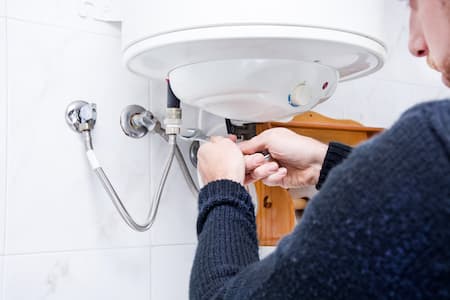Usual Heater Complications And Their
Usual Heater Complications And Their
Blog Article
Listed here below you'll find additional reliable resources pertaining to Water Heater Repair and Troubleshooting.

Visualize starting your day without your regular warm shower. That currently establishes a bad tone for the remainder of your day.
Every house needs a dependable water heater, however just a few recognize exactly how to take care of one. One easy way to keep your hot water heater in top form is to check for faults regularly and repair them as quickly as they show up.
Keep in mind to switch off your water heater prior to sniffing around for mistakes. These are the hot water heater faults you are probably to experience.
Water too warm or also cool
Every hot water heater has a thermostat that establishes just how warm the water gets. If the water entering into your house is too warm despite setting a convenient optimum temperature, your thermostat may be malfunctioning.
On the other hand, too cold water might be due to a stopped working thermostat, a broken circuit, or improper gas flow. For example, if you use a gas hot water heater with a damaged pilot light, you would obtain cold water, even if the thermostat is in perfect problem. For electric heating systems, a blown fuse might be the culprit.
Insufficient hot water
Water heaters can be found in many dimensions, depending on your warm water needs. If you lack warm water before every person has had a bathroom, your hot water heater is also tiny for your family size. You should consider setting up a bigger hot water heater tank or choosing a tankless water heater, which occupies much less space and is more resilient.
Strange sounds
There are at least 5 kinds of sounds you can hear from a hot water heater, but the most typical interpretation is that it's time for the hot water heater to retire.
To start with, you ought to be familiar with the typical appears a water heater makes. An electric heating system may seem various from a gas-powered one.
Standing out or banging audios usually indicate there is a slab of sediment in your storage tanks, and also it's time to clean it out. On the other hand, whistling or hissing sounds might just be your shutoffs allowing some pressure off.
Water leakages
Leakages can originate from pipelines, water connections, valves, or in the worst-case scenario, the storage tank itself. With time, water will corrode the container, and also locate its escape. If this takes place, you need to change your water heater as soon as possible.
Nonetheless, before your change your entire storage tank, make certain that all pipelines are in location which each shutoff works perfectly. If you still require assistance recognizing a leak, call your plumber.
Rust-colored water
Rust-colored water implies one of your hot water heater components is worn away. Maybe the anode rod, or the storage tank itself. Your plumber will be able to recognize which it is.
Warm water
No matter just how high you established the thermostat, you won't get any kind of warm water out of a heating system well past its prime. A water heater's effectiveness may lower with time.
You will certainly also obtain warm water if your pipelines have a cross connection. This indicates that when you activate a faucet, hot water from the heating system streams in together with normal, cold water. A cross connection is easy to area. If your warm water faucets still follow shutting the hot water heater shutoffs, you have a cross link.
Discoloured Water
Rust is a major root cause of dirty or discoloured water. Corrosion within the water tank or a stopping working anode rod might cause this discolouration. The anode rod protects the container from rusting on the within and should be examined yearly. Without a rod or a properly functioning anode pole, the hot water rapidly corrodes inside the storage tank. Contact a specialist water heater specialist to establish if replacing the anode rod will certainly fix the issue; if not, change your water heater.
Verdict
Ideally, your water heater can last ten years before you need an adjustment. Nevertheless, after the 10-year mark, you might experience any of these mistakes a lot more routinely. At this point, you need to include a brand-new water heater to your budget.
How To Troubleshoot 3 Common Water Heater Problems in Twin Cities
The Water Heater Is Leaking
A leaky cold water inlet valve A loose pipe fitting A leaky temperature and pressure relief valve A corroded anode rod A cracked tank Turn Off Your Water Heater:
Shut off your gas water heater by turning the gas valve on the unit to the “OFF” position. Shut off your electric water by switching its power off at your electrical panel. Look for a two-pole breaker labeled “water heater” and turn it to the “OFF” position. Move the ball valve connected to the water heater to be perpendicular to the piping at a 90° angle. Look for the Leak:
Depending on whether the water is coming from the tank's top or bottom, you’ll want to look for the leak in different locations.
If the leak comes from the top of the tank, carefully look for water escaping from the cold water inlet valve or loose pipe fittings. Rusted hot and cold water valves can have loose connections with the tank, with water leaking out of them.
https://mspplumbingheatingair.com/blog/how-to-troubleshoot-3-common-water-heater-problems
Hopefully you liked our piece on Water Heaters Problems. Thank you so much for taking the time to read through our piece of content. If you enjoyed reading our page if you please make sure you remember to pass it around. I thank you for reading our article about Common Problems with Your Home Water Heater.
We've got this! Report this page